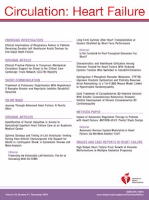
Circulation-Heart Failure
Scope & Guideline
Exploring breakthroughs in heart failure research.
Introduction
Aims and Scopes
- Pathophysiology and Mechanisms of Heart Failure:
Research articles explore the underlying mechanisms of heart failure, including hemodynamic changes, neurohormonal activation, and metabolic alterations. This foundational knowledge aids in the development of targeted therapies. - Clinical Management and Treatment Strategies:
The journal publishes studies on the efficacy and safety of various treatment modalities, including pharmacological therapies, device-based interventions, and lifestyle modifications, aimed at improving patient outcomes. - Patient-Centered Approaches and Quality of Life:
Emphasis is placed on understanding the impact of heart failure on patients’ quality of life, incorporating patient-reported outcomes and psychosocial factors into the management of heart failure. - Emerging Technologies and Innovations:
The journal highlights the role of new technologies such as remote monitoring, artificial intelligence, and biomarker research in enhancing the diagnosis and management of heart failure. - Health Disparities and Social Determinants of Health:
Research addressing the influence of social determinants on heart failure outcomes and strategies to mitigate health disparities is a key focus area, recognizing the importance of equity in healthcare.
Trending and Emerging
- Heart Failure with Preserved Ejection Fraction (HFpEF) Research:
There is a significant increase in research focused on HFpEF, emphasizing its unique pathophysiology, treatment options, and the need for improved diagnostic criteria, reflecting the growing recognition of this condition's complexity. - Integration of Digital Health Technologies:
The incorporation of digital health technologies for remote monitoring and telehealth has gained momentum, showcasing the potential to enhance patient management and outcomes in heart failure populations. - Focus on Comorbidities and Multimorbidity:
Research is increasingly examining the interplay between heart failure and other chronic conditions, such as diabetes and chronic kidney disease, highlighting the need for comprehensive management strategies. - Biomarker Research and Precision Medicine:
There is a trend towards utilizing biomarkers for risk stratification, treatment response, and disease monitoring, aligning with broader efforts in precision medicine. - Health Equity and Social Determinants of Health Research:
The journal is increasingly addressing health disparities and the impact of social determinants on heart failure outcomes, underscoring the importance of ensuring equitable access to care.
Declining or Waning
- Traditional Pharmacological Approaches:
There appears to be a decreasing emphasis on traditional pharmacological treatments as newer therapies and combination strategies gain attention. This shift reflects a growing interest in personalized medicine and innovative treatment paradigms. - Invasive Procedures for Heart Failure Management:
Research on invasive procedures such as routine catheterization and surgical interventions for heart failure management is declining, possibly due to the rise of less invasive monitoring and treatment techniques. - Single-Center Studies:
The prevalence of single-center studies has diminished as the field moves towards larger, multicenter trials that provide more generalizable data and insights, reflecting a trend towards collaborative research efforts.
Similar Journals

Cardiology Journal
Innovating the landscape of cardiovascular medicine.Cardiology Journal, published by VIA MEDICA, stands as a prominent resource in the field of cardiology and cardiovascular medicine, with an ISSN of 1897-5593 and an E-ISSN of 1898-018X. Recognized for its Open Access model established since 1994, this journal facilitates widespread dissemination of critical research findings, allowing practitioners and researchers globally to access valuable insights without barriers. Based in Poland, with an address at UL SWIETOKRZYSKA 73, 80-180 GDANSK, it has achieved a respectable Q2 classification in 2023 for both Cardiology and Miscellaneous Medicine categories, reflecting its influence and quality within the scholarly community. With a Scopus ranking placing it at #117 out of 387 in Cardiology, it lies within the 69th percentile, underpinning its commitment to advancing knowledge in cardiovascular health. The journal’s converged years extending from 2006 to 2024 ensure it captures ongoing developments in a rapidly evolving field. As such, the Cardiology Journal serves as an indispensable platform for researchers, professionals, and students dedicated to exploring the frontiers of cardiac science and improving patient care.

Current Treatment Options in Cardiovascular Medicine
Navigating the future of cardiology with expert analyses.Current Treatment Options in Cardiovascular Medicine is a leading journal dedicated to advancing knowledge in the field of cardiology and cardiovascular medicine. Published by SpringerNature, this journal seeks to bridge the gap between clinical practice and research by providing comprehensive reviews, insightful analyses, and updates on the latest treatment modalities available for cardiovascular diseases. With an ISSN of 1092-8464 and an E-ISSN of 1534-3189, it displays a commitment to disseminating critical information to healthcare professionals and researchers globally. Despite its recent categorization in the Q3 quartile, the journal continues to maintain relevance with a Scopus rank of #246 in the field, reflecting its contribution to the ongoing discourse in cardiovascular care. The publication encompasses a broad spectrum of topics, from interventional cardiology to pharmacotherapy, supporting the journal's objective to enhance patient care through evidence-based treatment options. Researchers, professionals, and students will find Current Treatment Options in Cardiovascular Medicine an indispensable resource for staying at the forefront of cardiovascular innovations and applications.
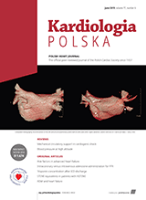
Kardiologia Polska
Advancing Heart Health Through Scholarly InsightsKardiologia Polska, the esteemed journal of the Polish Cardiac Society, has established itself as a vital resource in the field of cardiology and cardiovascular medicine since its inception in 1954. With an ISSN of 0022-9032 and an E-ISSN of 1897-4279, this journal serves as a platform for groundbreaking research and scholarly articles that contribute to the advancement of heart health. Although currently not an open access journal, it remains an essential reference for practitioners and researchers seeking to stay abreast of the latest developments in cardiovascular science. The journal reflects its scholarly depth through a Category Quartile of Q3 and a commendable Scopus ranking at the 48th percentile in its field. Published primarily in Poland, it caters to a global audience eager to explore comprehensive studies spanning clinical cardiology, innovative therapeutic approaches, and emerging cardiovascular trends. Join a thriving academic community by engaging with the invaluable insights and research contributions found within the pages of Kardiologia Polska.

Nepalese Heart Journal
Elevating Cardiology Practices in Nepal and BeyondNepalese Heart Journal, published by the CARDIAC SOC NEPAL, serves as a premier platform for disseminating knowledge in the field of cardiology and cardiovascular health. With an ISSN of 2091-2978, this journal aims to bridge the gap between researchers, clinicians, and academicians by presenting high-quality, peer-reviewed articles that address clinical practices, innovative research, and emerging trends in heart disease management, especially within the context of Nepal and the surrounding region. Although it operates under a traditional publishing model, its commitment to excellence aids in reinforcing the scientific discourse in an area critical to public health. The journal is a valuable resource for professionals and students alike who are focused on advancing their understanding of cardiology and its implications for health policy and practice. Exploring the intersections of local challenges and global advancements in heart health, the Nepalese Heart Journal is poised to contribute meaningfully to the evolving landscape of cardiovascular research.

Journal of the American Heart Association
Bridging Science and Practice for a Healthier HeartThe Journal of the American Heart Association, published by WILEY, serves as a premier platform for advancing cardiovascular medicine through its commitment to open access, fostering global dissemination of cutting-edge research since 2012. It proudly holds a prestigious position within the top quartile (Q1) in the categories of Cardiology and Cardiovascular Medicine, as evidenced by its Scopus ranking of #49 out of 387 journals, placing it in the 87th percentile. With a focus on innovative studies and transformative findings, this journal is essential for cardiologists, researchers, and healthcare professionals seeking to stay at the forefront of cardiovascular knowledge. The journal aims to bridge the gap between basic science and clinical practice, presenting findings that shape the future of heart health treatment and prevention. As a resource for academic and clinical communities alike, the Journal of the American Heart Association is dedicated to enhancing the understanding and treatment of cardiovascular diseases globally.
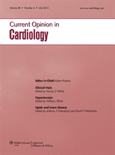
CURRENT OPINION IN CARDIOLOGY
Navigating the latest trends in cardiovascular medicine.CURRENT OPINION IN CARDIOLOGY, published by LIPPINCOTT WILLIAMS & WILKINS, is an esteemed journal in the field of cardiology that has been serving the academic community since 1988. With a robust focus on the latest developments and emerging trends in cardiovascular medicine, this journal aims to bridge the gap between clinical practice and research, offering critical insights and expert commentary. The journal is recognized in the medical community, achieving a 2023 Scopus rank of #148 out of 387 in its category, placing it in the 61st percentile. Although it operates under a subscription-based model, CURRENT OPINION IN CARDIOLOGY remains an essential resource for researchers, practitioners, and students seeking cutting-edge knowledge and advancements in cardiology. As a Q2 journal in the field, it continues to foster dialogue and provide a platform for disseminating impactful cardiovascular research, ultimately contributing to improved patient outcomes and informed clinical decisions.
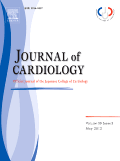
Journal of Cardiology
Pioneering research to transform cardiology practices.Journal of Cardiology, published by ELSEVIER, stands as a prominent resource in the field of cardiology and cardiovascular medicine. With a rich history since its inception in 1987, this peer-reviewed journal aims to disseminate cutting-edge research that enhances the understanding and treatment of cardiovascular diseases. Its 2023 ranking places it in the Q2 category within its discipline, reflecting its significance and impact, as evidenced by a Scopus rank of #123 out of 387 journals, positioning it in the 68th percentile of its field. The journal is headquartered in Japan, providing a unique perspective on cardiological advances relevant not only to the Asian continent but also globally. Though it does not currently offer open access, the Journal of Cardiology remains a vital institutional resource for researchers, clinicians, and students seeking to push the boundaries of cardiovascular science and improve patient outcomes.
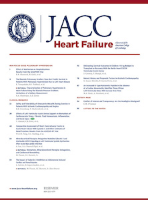
JACC-Heart Failure
Elevating Standards in Cardiology ResearchJACC-Heart Failure is a premier journal in the field of cardiology, published by Elsevier Science Ltd, that has rapidly established itself as a vital resource for researchers and practitioners focused on heart failure and cardiovascular health. With an impressive impact factor and ranking in the Q1 category for Cardiology and Cardiovascular Medicine, this journal is recognized for its high-quality peer-reviewed articles that contribute significantly to advancements in clinical practice and scientific understanding of heart failure. As of 2023, the journal ranks #10 out of 387 in its field, positioning it in the 97th percentile of Scopus rankings, which highlights its influential role in disseminating cutting-edge research. Although the journal does not operate under an open-access model, it maintains a rigorous review process, ensuring the publication of articles that are both innovative and clinically relevant. Targeting an audience of dedicated researchers, healthcare professionals, and students, JACC-Heart Failure serves as an essential platform for exploring the complexities of heart failure treatments, management strategies, and future directions in cardiology.
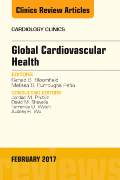
CARDIOLOGY CLINICS
Transforming clinical practice with impactful cardiology research.CARDIOLOGY CLINICS is a prestigious journal published by W B SAUNDERS CO-ELSEVIER INC, offering insightful and comprehensive reviews in the field of cardiology and cardiovascular medicine since its inception in 1983. With its ISSN 0733-8651 and E-ISSN 1558-2264, the journal has established a significant impact factor within the academic community, holding a Q2 ranking in both Cardiology and Cardiovascular Medicine as well as in Medicine (miscellaneous) for 2023. Located in the heart of Philadelphia, USA, it serves as a vital resource for researchers, clinicians, and students seeking to deepen their understanding of cardiovascular diseases and advancements in treatment. Although it operates under a traditional subscription model, the journal remains committed to disseminating valuable knowledge that shapes current practices and informs future research directions. As it converges towards its 2024 issues, CARDIOLOGY CLINICS continues to play an influential role in enhancing the discourse on cardiovascular health worldwide, ensuring that its audience stays at the forefront of clinical and scientific developments.
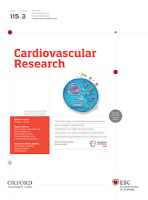
CARDIOVASCULAR RESEARCH
Pioneering discoveries in cardiology and physiology.CARDIOVASCULAR RESEARCH, published by Oxford University Press, is a premier academic journal dedicated to the evolving field of cardiology and cardiovascular medicine. With a remarkable impact factor reflecting its significant contribution to the scientific community, this journal maintains a Q1 ranking in both Cardiology and Physiology categories, demonstrating its commitment to publishing high-quality research that influences clinical practices and healthcare outcomes. Established in 1967, the journal has consistently provided a platform for innovative studies and reviews, aiming to advance our understanding of cardiovascular physiology and pathology. Researchers, professionals, and students will find published articles crucial for their work, as the journal covers a broad spectrum of topics including molecular biology, genetics, and clinical studies. While currently not offering open access options, CARDIOVASCULAR RESEARCH remains accessible through institutional and individual subscriptions, ensuring that the latest findings are available to those in the cardiovascular science community.